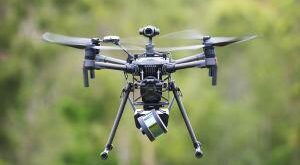A drone delivery study published by a German university concludes that compared to electric vehicles, drones aren’t necessarily a big win for the environment – at least not in every scenario.
The Drone Delivery Study
Researcher Thomas Kirschstein developed a simulation designed to examine the claim that drones, as electric vehicles, are an eco-friendly solution for applications like drone delivery.
“In this paper an energy consumption model for drones is proposed to describe the energy demand for drone deliveries depending on environmental conditions and the flight pattern,” writes Kirschstein. “The model is used to simulate the energy demand of a stationary parcel delivery system which serves a set customers from a depot. The energy consumed by drones is compared to the energy demand of Diesel trucks and electric trucks serving the same customers from the same depot.”
Which Vehicles Consume Less Energy? It Depends.
Drones require more energy to take off and land – and if you add the weight of a parcel, that requirement is exaggerated. Add in wind and other factors, assuming that drones leave from the same central depot that trucks do, drones don’t do much better than Diesel fueled trucks in some situations. “The results indicate that switching to a solely drone-based parcel delivery system is not worthwhile from an energetic perspective in most scenarios,” says Kirschstein.
However, drone delivery gets a lot closer in rural areas. “A stationary drone-based parcel delivery system requires more energy than a truck-based parcel delivery system particularly in urban areas where customer density is high and truck tours are comparatively short. In rather rural settings with long distances between customers, a drone-based parcel delivery system creates an energy demand comparable to a parcel delivery system with electric trucks provided environmental conditions are moderate,” says the study.
The Conclusion? It Might Be Complicated
Purely on the basis of energy consumption, drones don’t compare dramatically well: especially in urban situations. But that’s not the end of the story – as drones are electric, they do offer advantages. “Although parcel deliveries by UAVs require more energy than deliveries with EVs or DVs in most situations, replacing DVs by UAVs for parcel delivery might be ecologically beneficial as electricity can be generated in an eco-friendly way e.g. by using wind mills or solar panels,” says the study.
In rural areas, drones fare even better. “Drones consume a comparable or even slightly smaller amount of energy than trucks in rather rural settings with large areas to cover and low customer density provided wind conditions are calm or moderate,” says the study.
Because of the variables, including population density and wind, drones may show their best advantage as the application progresses, and operators are able to optimize their use as part of a multi-modal delivery system.
https://dronelife.com/2020/04/23/drone-delivery-study-drones-may-not-be-as-eco-friendly-as-hyped/
 Unmanned Aerial Vehicle The latest drone news
Unmanned Aerial Vehicle The latest drone news



